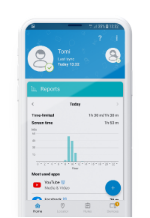We live in the era of photo editing and posting. There is virtually no going back. Photo editing apps have been around ever since the dawn of social media platforms. They allow you to have a glimpse of what you might look like in 50 years or with pink hair. They provide not only entertainment but also creativity. The apps have been used widely by kids and adults alike.
The new trend of artificial intelligence (AI) editing apps has been gaining popularity amongst all folks on social media. The fun aspect of it is that such an app takes your photo and creates alternate versions of it, avatars in various artistic styles. But is it safe for your children?
Privacy?
The most commonly used and known AI editing app, Lensa, promises that it will take your image and create an avatar, an alternate self in various art styles. Sounds like great fun, right? The whole premise of such apps is that you input your photo and the app gives you a few altered images. But what happens to all your data?
It is always good to look at the App Store/Google Play when installing a new app to check the reviews, manufacturer, and rules of use. In the case of Lensa, the app admits to collecting data as well as sharing the data with third parties.
And above all, Lensa does not have parental controls or age verification in place. Even though the app states that selfies should only be submitted by people over the age of 13, there is virtually no way for it to make sure only people over 13 use it. How can a parent protect their child on an app that does not offer its own way to do that? Simply by relying on trustworthy parental controls to protect their child in the online world.
The privacy implications of using such an app are one thing. Another emerges when we start thinking about the contents of the app. There have been reports of hypersexualized images in the app, diluting ethnic features, slimming of bodies, and unrealistic beauty standards, which can all be detrimental to a child´s psychology.
Blind bargain art
Once you feed the app your photos, there is no way of knowing exactly what you might get back. The apps are unpredictable, meaning they might give you portraits that have been altered in such a way that is NSFW (not safe for work) or sexualized, in some instances even topless.

Even if your kid is innocently using the app, they might still be faced with an oversexualized version of themselves. But what is even worse, is that it poses the question, could tools like this be used with future malicious intent by others?
But even if your child is not faced with an inappropriate version of themselves, they might be faced with a “perfect” version. Social media and the online world are already filled with unrealistic expectations that are fed daily to our kids. But this is another level. This is their face, but “better.” Their hair, but shinier. Their body, but thinner. This might create an internal desire for the child to look like these fake versions of themselves, resulting in leaving natural beauty standards behind and creating an internal struggle to look like these unrealistic versions, with no human natural flaws and with computer-generated perfect skin and features not even plastic surgery might get them. This can be really damaging to a child, a teenager, or even an adult.
Arm your kids with conversation
It is really fun and exciting creating fantasy images of yourself or see what you might look like had you been born hundreds of years ago. It is also exciting to know how far technology has come and what a well-written algorithm is able to do and how much it is able to learn. Just bear in mind, anything your child uses online is a potential threat to their online safety and their mental health. It is really important to have an open and honest relationship with your child. Talk to them about the threats and the wonders of the digital world. Make it a world not to be feared but to be prepared for. And remember, we all have an opportunity to help kids be safer online.



